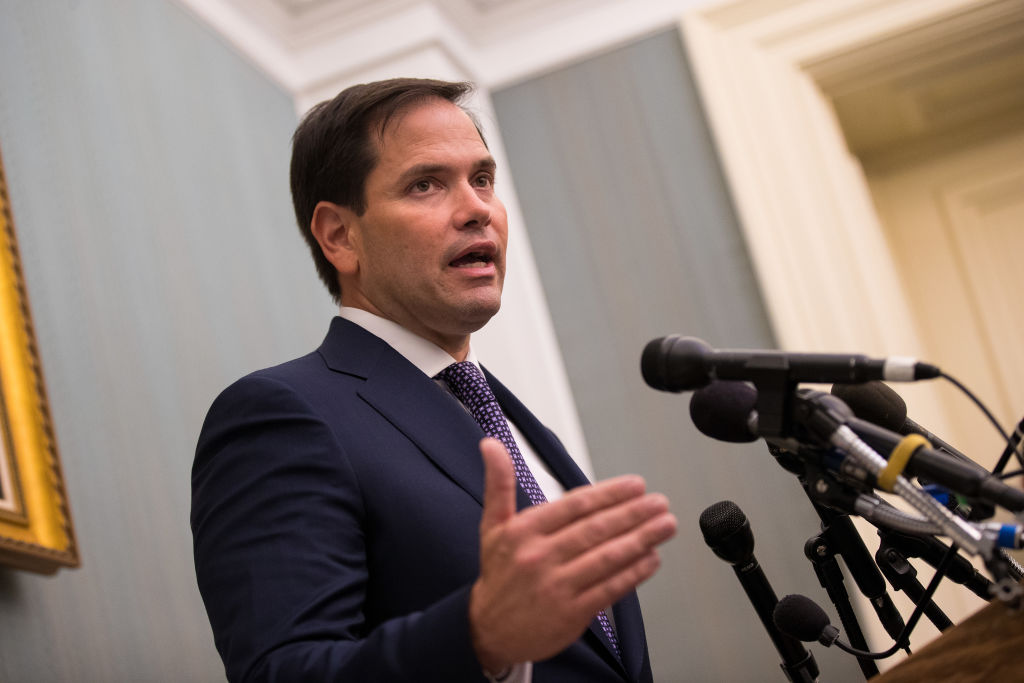GOP senator says tax cuts must be followed by 'structural changes to Social Security and Medicare'


A free daily email with the biggest news stories of the day – and the best features from TheWeek.com
You are now subscribed
Your newsletter sign-up was successful
Senate Republicans started the clock for a final vote on their tax plan Wednesday evening, but among the unresolved demands from GOP waverers is a provision to prevent the bill from adding up to $1.5 trillion to the federal deficit over 10 years. No serious analysis has suggested the growth from slashing taxes for corporations and other businesses would make up that shortfall, and Republicans haven't offered any evidence. At a Politico Playbook forum on Wednesday, Sen. Marco Rubio (R-Fla.) said that cutting taxes needs to be followed by cutting spending on popular federal programs.
"I analyze this very differently than most," Rubio said. "Many argue that you can't cut taxes because it will drive up the deficit. But we have to do two things. We have to generate economic growth which generates revenue, while reducing spending. That will mean instituting structural changes to Social Security and Medicare for the future." He suggested reducing benefits and raising the retirement age for future retirees, so people can prepare for the changes. "Tax reform is the economic component of this equation," Rubio said. "When more people are working, there are more taxpayers and more revenue, but that alone won't be enough. You are still going to have a debt problem in the absence of spending cuts."
The broadly unpopular tax bill — rushed through with almost no debate or expert testimony and zero Democratic input — would have wide-ranging and uncertain effects on all Americans. As AARP noted, the legislation already includes $25 billion in automatic Medicare cuts for next year alone, along with $111 billion in other cuts to federal programs, and it would either raise taxes or keep them the same for 6.3 million Americans 65 or older in 2019 and 10.8 million by 2027. President Trump, who is pushing the legislation hard, promised during the campaign he would not change Medicare, Medicaid, or Social Security. You can watch Rubio's interview at Politico.
The Week
Escape your echo chamber. Get the facts behind the news, plus analysis from multiple perspectives.

Sign up for The Week's Free Newsletters
From our morning news briefing to a weekly Good News Newsletter, get the best of The Week delivered directly to your inbox.
From our morning news briefing to a weekly Good News Newsletter, get the best of The Week delivered directly to your inbox.
A free daily email with the biggest news stories of the day – and the best features from TheWeek.com
Peter has worked as a news and culture writer and editor at The Week since the site's launch in 2008. He covers politics, world affairs, religion and cultural currents. His journalism career began as a copy editor at a financial newswire and has included editorial positions at The New York Times Magazine, Facts on File, and Oregon State University.
-
 Local elections 2026: where are they and who is expected to win?
Local elections 2026: where are they and who is expected to win?The Explainer Labour is braced for heavy losses and U-turn on postponing some council elections hasn’t helped the party’s prospects
-
 6 of the world’s most accessible destinations
6 of the world’s most accessible destinationsThe Week Recommends Experience all of Berlin, Singapore and Sydney
-
 How the FCC’s ‘equal time’ rule works
How the FCC’s ‘equal time’ rule worksIn the Spotlight The law is at the heart of the Colbert-CBS conflict
-
 TikTok secures deal to remain in US
TikTok secures deal to remain in USSpeed Read ByteDance will form a US version of the popular video-sharing platform
-
 Unemployment rate ticks up amid fall job losses
Unemployment rate ticks up amid fall job lossesSpeed Read Data released by the Commerce Department indicates ‘one of the weakest American labor markets in years’
-
 US mints final penny after 232-year run
US mints final penny after 232-year runSpeed Read Production of the one-cent coin has ended
-
 Warner Bros. explores sale amid Paramount bids
Warner Bros. explores sale amid Paramount bidsSpeed Read The media giant, home to HBO and DC Studios, has received interest from multiple buying parties
-
 Gold tops $4K per ounce, signaling financial unease
Gold tops $4K per ounce, signaling financial uneaseSpeed Read Investors are worried about President Donald Trump’s trade war
-
 Electronic Arts to go private in record $55B deal
Electronic Arts to go private in record $55B dealspeed read The video game giant is behind ‘The Sims’ and ‘Madden NFL’
-
 New York court tosses Trump's $500M fraud fine
New York court tosses Trump's $500M fraud fineSpeed Read A divided appeals court threw out a hefty penalty against President Trump for fraudulently inflating his wealth
-
 Trump said to seek government stake in Intel
Trump said to seek government stake in IntelSpeed Read The president and Intel CEO Lip-Bu Tan reportedly discussed the proposal at a recent meeting
